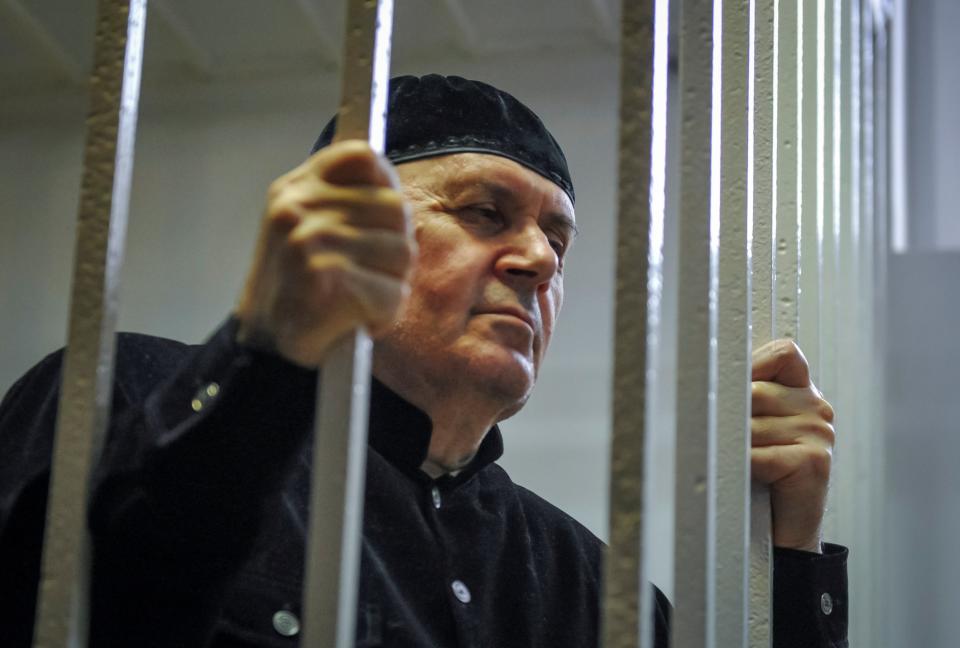Oyub Titiyev: Chechen rights activist receives four-year jail term in ‘sham trial’
One of the most closely watched trials in Russia has ended with the jailing of an elderly human rights activist on largely derided drugs possession charges.
On Monday, a Chechen court sentenced Oyub Titiyev, 61, to four years in a penal settlement.
Mr Titiyev, known for his work researching torture and disappearances inside the largely Muslim Russian republic, was arrested in January 2015 after police claimed to have found 200g of marijuana in his car.
In the end, it took judge Madina Zainetdinova a whole day to deliver her sentence. Owing to a quirk of the Russian justice system, entire rulings are read out at such speed they are barely audible.
A few hours are not unusual, but today’s nine hours of waiting – during which time everyone, including the activist, was required to stand throughout – was close to a record.
When the verdict finally came at around 8pm local time, the length of sentence barely departed from the initial prosecution demands.
Surprisingly, however, the judge opted for a less harsh category of incarceration, a penal settlement, than that which was initially requested. In the circumstances, it was almost a show of leniency.
In his closing admission to the court a week ago, Oyub Titiyev said he was under no illusions he would be found guilty: “There have been no acquittals in Chechnya in recent years … it seems I’m considered an enemy because I tried to draw the attention of the authorities to rights violations.”
Friends and colleagues dismissed the drugs claims he faced as ludicrous.
According to Tanya Lokshina, lead Russia researcher for Human Rights Watch, who has known Mr Titiyev since 2003, the charges were deliberately constructed “to smear a devout Muslim man”.
But they failed, she added, because several neighbours dared to testify as character witnesses despite the “pervasive climate of fear” in the region.
“Everyone understands Oyub wouldn’t touch drugs or alcohol with a barge pole,” she told The Independent. “Believing the prosecution case is akin to believing in fairy dust.”
There were many inconsistencies with the case. It was never, for example, made clear how police had “accidentally” seen suspicious items in Mr Titiyev’s car. How the only witness, a twice-convicted drugs criminal, who claimed to see Titiyev smoking marijuana in 2017, failed to point him out in an identity parade. Or why all CCTV cameras in the police department and on the route from the arrest site had failed.
On the other hand, Mr Titiyev’s professional activities clearly made him a target.
“Everyone understands Oyub wouldn’t touch drugs or alcohol with a barge pole. Believing the prosecution case is akin to believing in fairy dust.”
Tanya Lokshina, Human Rights Watch
As head of the local Chechen branch of the Memorial Human Rights Centre, a respected Russian NGO, he was largely responsible for documenting thousands of difficult cases of torture, disappearances and killings at the hands of local authorities. The work was almost akin to partisan warfare – and so sensitive it was generally carried out in secret.
His predecessor, Natalya Estemirova, was abducted and murdered on the job in 2009.
There was never a proper investigation of her murder. But accusations have been made about the involvement of the region’s leader, Ramzan Kadyrov, who has created a dictatorship as part of a security bargain with Moscow.
Mr Kadyrov made little secret of his wishes for the outcome of Mr Titiyev’s trial ahead of today’s verdict. In an address aired on local Chechen TV, he described the activist as a drug addict and an “enemy of the people with no homeland, nation nor religion”.
Human rights activists, he said, were like terrorists and would be “driven out” of Chechnya the same way.

 Yahoo News
Yahoo News 

